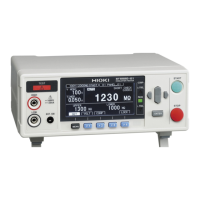168
Troubleshooting
Symptom Cause and solution Reference
Unstable
measured values
The power frequency setting may not be appropriate.
Change the power frequency according to the customer
environment.
p. 71
A load containing capacitance components may be
connected. It may take time for the measured value to
stabilize depending on the capacitance components. Extend
the test duration.
p. 39
The measurement cable is long and the measured value
may be affected by the wiring capacity.
p. Appx.6
Noise may be causing the unstable measured value. p. Appx.7
U.FAIL and L.FAIL
lamps turn on at the
same time.
The set upper and lower limits (comparators) and range
setting may not match.
Set the lower limit based on the set range’s accuracy range.
p. 44
External Control
Symptom Cause and solution Reference
Communications
cannot be
performed
smoothly.
Check the RS-232C transfer speed. p. 114
Check the commands that are sent and received using
the communications monitor function. The areas where
command and execution errors occur can be checked.
p. 120
Control cannot be
performed with
EXT.I/O.
The wiring may be wrong.
• The connectors may be disconnected.
• The pin number may be wrong.
• ISO_COM terminal wiring
• NPN/PNP setting
• Contact (or open collector) control (not controlled by
voltage)
• Power supply to EXT.I/O (It is not necessary to supply
power to the instrument.)
p. 81
Check the input and output signals using the EXT.I/O test
function.
p. 103
A test does not
start.
Check the pulse width of the START and TEST signals.
Refer to the timing chart.
p. 88

